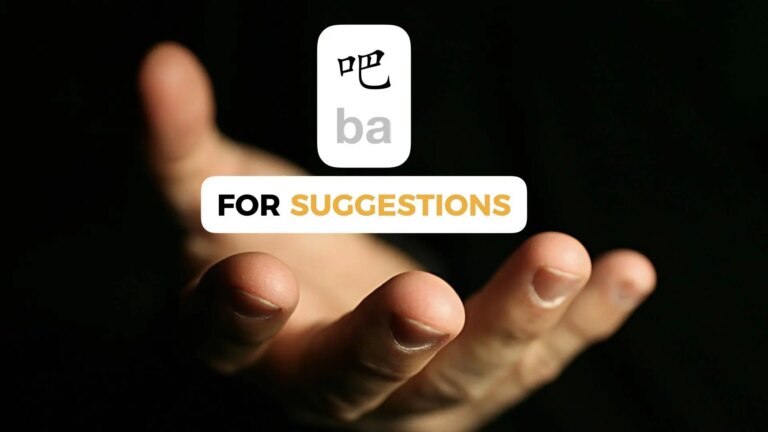Question Particle 吧 ba in Chinese

Using the Question Particle 吧 ba for Suggestion
走吧 zǒuba was the common phrase we used to express that the question particle “吧 ba” can indicate a suggestion. When used in this way, it has a similar function as “Let’s [insert suggestion here]” in English (e.g., “let’s go”). The grammar is the opposite of course because 吧 ba always goes at the end of a sentence. It is incredibly simple when it has this function, so look out for it when Chinese people are speaking around you and potentially making decisions together.
Using the Question Particle 吧 ba for Educated Guesses
It has a second use that is related, but not exactly the same: an educated guess. It’s like you are “suggesting” what the reason is for some observed phenomenon. For example, suppose you were at your friend’s house, and she has a little daughter who is a toddler, but your friend’s daughter looks a bit uncomfortable or upset. In Chinese, you might say “她饿了吧?tā è le ba?”, which means “She’s probably hungry, right?”. It isn’t as clear a suggestion as “Let’s go eat” (我们一起出去吃饭吧 wǒmen yìqǐ chūqu chīfàn ba”), but it is a suggestion as to why your friend’s toddler is looking uncomfortable.
Does It Have a Question Mark?
Effectively, if it is a simple suggestion, there is no question mark. If it is an educated guess, there is still some level of uncertainty and therefore will usually have a question mark. Consider three prevalent words and what they mean if they have the question particle 吧 ba after them.
好吧? hǎoba?
对吧? duìba?
是吧? shìba?
好吧 hǎoba & The Chinese Sax Player
Take 好吧 hǎoba for example. The first time Phil understood the “educated guess” version of the question particle “吧 ba” was when he saw it used rhetorically. While in Inner Mongolia playing a gig with his band, Phil observed a Chinese saxophone player doing a solo performance on stage with a background music track. This guy was full of charisma, and he would say things like “I’m gonna play a song by [Insert famous Chinese pop start here], 好吧?!.”
In this context, “好吧 hǎoba” is making the educated guess that the audience is going to be OK with (好 hǎo) the following song. He’s not 50/50, he’s confident. Technically it is still a question (hence the question mark), but it implies that he’s pretty sure the audience isn’t going to respond with “No, get off the stage!”.
Correct? Right?
Both 对吧 duìba and 是吧 shìba function the same way. 对 duì means “correct,” so if you say “对吧 duìba?,” it has the same tone you have when confirming something you are nearly certain is true. For example, “The Eagles won the most recent super bowl, right? (对吧?).. Seeing as “是 shì” just means “is,”` saying “是吧 shìba” means “isn’t it?”.
Example Sentences for Suggestion with Question Particle 吧 ba
- 你说谢谢吧 nǐ shuō xièxie ba – You should say thank you.
- 我们吃饭吧 wǒmen chīfàn ba – Let’s eat
- 你们去看电影吧 nǐmen qù kàn diànyǐng ba – You all should go watch a movie
- 爸爸,你去帮妈妈吧 bàba, nǐ qù bāng māma ba – Dad, you should go help mom.
- 我们出去玩儿吧 wǒmen chūqu wánr ba – Let’s go out and have fun.
Example Sentences for Educated Guesses
- 她饿了吧?tā è le ba? – She’s hungry, yeah?
- 妈妈怕马吧? māma pà mǎ ba? – Mom’s afraid of horses, isn’t she?
- 她是中国人吧?tā shì zhōngguó rén ba? – She must be Chinese
- 你爱我吧?nǐ ài wǒ ba? – You love me, yeah?
- 没问题吧?méi wèntí ba? – Not a problem, yeah?
Keep a lookout for the question particle 吧 ba, and focus on reading as many of these sentences as possible.
Also, don’t forget there is no such thing as “learning” grammar, it is more about acquisition.
Learn how to pronounce and also learn Chinese characters for free with our 14-day free trial giving you full access to our entire curriculum.
You will be able to read, write and pronounce Chinese characters and get an overall “plan of attack” for your ENTIRE Chinese journey all the way to fluency and literacy.








